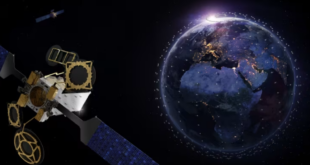
The Russian state space corporation, Roscosmos, has announced its intention to build a constellation of satellites called Marathon to serve the expanding Internet of Things (IoT) market, as part of its Sphere satellite system.
The announcement comes amidst an audit into Roscosmos over missing billions of rubles, as well as a security row with Russian security services over the launch of, and access to, foreign communications satellites for broadband Internet.
The Marathon IoT satellite system is planned to be a part of Roscosmos’ Sphere system that consists of the GLONASS positioning, navigation, and timing (PNT) constellation; Earth observation satellites; and communications and data relay satellites, all of which create a system of systems that serve Russian satellite application needs. The entire Sphere system is supposed to comprise of 640 satellites launched in batches in 2022, 2024, and 2026.
Earlier in 2018, Russian President Vladimir Putin described Sphere as one of the more “commercially viable projects” developed by Roscosmos, and said that the concept has generated interest among domestic Russian companies and industry, as well as among a number of foreign countries.
“I believe the [Roscosmos] can and should ensure a steady flow of revenue from paid services rendered to other sectors of the economy in the sphere of information, navigation and communications. By doing so, we will direct federal budget funds toward the future goals of the space industry,” President Putin was quoted as saying.
The Sphere system is also supposed to include laser communication satellites, though details of this capability were not available at the time of writing.
“The system will be built on gradually. The constellation will be deployed within four years, in 2022-2026,” a Russian space industry source told Russian media in early November 2018.
The announcement on the Marathon IoT constellation comes as Roscosmos is about to be audited by the Russian state auditor, the Accounts Chamber, over allegations of up to U.S.$11.9 billion missing.
“We have serious problems with Roscosmos,” said the chairman of the Accounts Chamber, Alexei Kudrin, in a Russian television interview.
“Procurement procedures are bad, prices are too high, many projects are unfinished or halted, and funds stand unused for months, and several billion have been lost – stolen – and investigations are ongoing,” he added.
Additionally, Roscosmos is at odds with the Russian security service, the FSB, over its plans to orbit satellites built by satellite broadband megaconstellation company OneWeb over the course of 21 Soyuz launches in the coming years.
The FSB is concerned that the satellites will allow Russians to circumvent tight governmental controls on Internet access, and have already denied landing rights to other foreign satellite broadband companies to operate in Russia. Moscow, and other like-minded governments such as that in China, seeks to establish sovereignty over cyberspace and the Internet within their borders and territories.
 SpaceWatch.Global An independent perspective on space
SpaceWatch.Global An independent perspective on space




